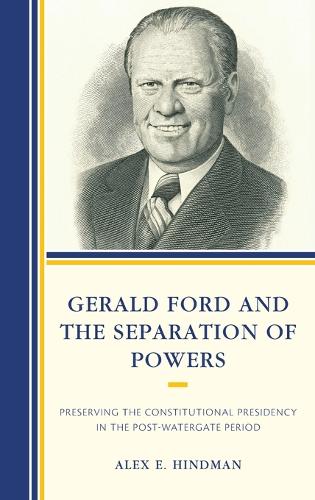
Gerald Ford and the Separation of Powers: Preserving the Constitutional Presidency in the Post-Watergate Period
(Hardback)
Publishing Details
Gerald Ford and the Separation of Powers: Preserving the Constitutional Presidency in the Post-Watergate Period
By (Author) Alex E. Hindman
Bloomsbury Publishing PLC
Lexington Books
3rd February 2017
United States
Classifications
Professional and Scholarly
Non Fiction
History of the Americas
Constitution: government and the state
Political leaders and leadership
973.925092
Physical Properties
Hardback
296
Width 159mm, Height 237mm, Spine 28mm
621g
Description
The constitutional presidency is the crown jewel of the separation of powers in the American system. Designed in 1787, the office was structured to weather a wide variety of political circumstances, accommodate broad ranges of personalities in its incumbents and educate officeholders to become better presidents. Nowhere are these three effects clearer than during the brief, unelected tenure of President Gerald Ford, because he occupied the presidency amid tremendous strains on the country and the separation of powers. After the dual traumas of Watergate and Vietnam, the public was profoundly skeptical of government in general and the presidency in particular. As a result, the post-Watergate Congress claimed the mantle of public support and proposed reforms that could have crippled the presidencys constitutional powers. Weakened by the Nixon pardon, Ford stood alone in this environment without many of the informal political strengths associated with the modern presidency. As a result he had to rely, in large measure, on the formal powers of his constitutional office. Based on archival research, this book shows that Fords presidency placed the Constitution at the center of his time in office. The constitutional presidency allowed him to preserve his own political life, his presidential office, and the separation of powers amid a turbulent chapter in American history.
Reviews
Alex E. Hindman has written an important and long overdue book on the presidency of Gerald R. Ford. Taking office under extraordinary circumstances, Ford doggedly resisted efforts to transform the American constitutional order.Hindman has done a remarkable public service by reminding us of Ford's vital role in protecting both presidential prerogatives and the Constitution itself. The nation's 38th president never received the tributes due himnow, thanks to Alex Hindman, that is no longer the case. -- Stephen F. Knott, United States Naval War College
No president since Lincoln entered the White House in a more precarious political position than Gerald Ford in 1974, and the drama of those years has overshadowed Fords deeper statesmanship in defending the presidency and the separation of powers from the destructive furies the Vietnam-Watergate era unleashed. Alex Hindman deserves our gratitude for throwing a light on this important subtext of Fords unique tenure as our only un-elected president. -- Steven F. Hayward, University of California, Berkely
Author Bio
Alex E. Hindman is visiting assistant professor of political science at the College of the Holy Cross.
